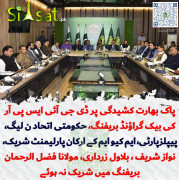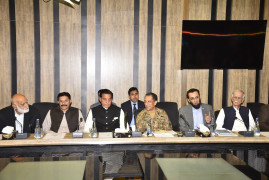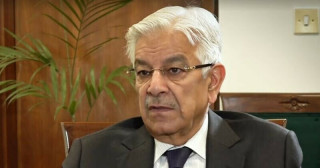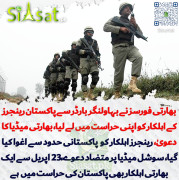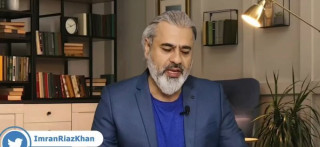karachiwala
Prime Minister (20k+ posts)
By Karen DeYoung and Karin Brulliard, Published: May 20
Pakistan has ordered the departure of up to 20 percent of the roughly 150 U.S. Special Operations forces trainers in that country in the wake of a series of clashes between the two governments, a U.S. military official said.
Between 25 and 30 trainers were told to leave in the weeks before the U.S. commando raid that killed Osama bin Laden this month, apparently in response to an earlier incident involving a CIA employee who shot and killed two Pakistanis in Lahore, the official said, speaking on the condition of anonymity to discuss the sensitive relationship. Pakistan had threatened to reduce the U.S. presence there after grudgingly releasing the employee, Raymond Davis, in March.
Since the al-Qaeda leader was fatally shot in his hideout in the Pakistani city of Abbottabad, relations have become even more frayed. The Obama administration has asked pointed questions about bin Ladens support system in Pakistan, and the Pakistanis assert that U.S. raiders violated their sovereignty.
Marc Grossman, the U.S. special representative for Afghanistan and Pakistan, met with military and government officials in the Pakistani capital this week as the administration moved to reestablish the partnership with one of its key counterterrorism allies even as it continued to demand answers about bin Laden. In an interview with Pakistans Express Tribune, Grossman said the two countries need to work together against the shared terrorism threat.
Also Friday, news services reported that an airstrike by a suspected CIA drone killed at least four people in the tribal area of North Waziristan, home to rear bases used by al-Qaeda and other militant groups for attacks on NATO forces in Afghanistan.
In what was likely to further complicate the task of repairing ties, the Pakistani English-language newspaper Dawn published U.S. cables, obtained by the WikiLeaks Web site, that depicted the Pakistani army chiefs approval of the U.S. drone campaign and his request, in 2008, for its expansion. Pakistan has long publicly denied approval of the drone campaign, and a senior Pakistani military official said the request had only been for drone-provided intelligence.
Another cable, released Friday by WikiLeaks, said that the military had twice, in late 2009, approved the deployment of U.S. Special Operations teams to North Waziristan and South Waziristan to provide intelligence and surveillance assistance during Pakistani military operations. The secret cable, dated Oct. 9, 2009, and signed by then-U.S. Ambassador Anne W. Patterson, noted that the cooperation would likely end if it became public. It was first reported in a New York Times article last fall.
The Special Operations trainers are assigned to Pakistani Frontier Corps troops that operate in the tribal areas. The Pakistani military official said any reduction in their numbers was not an expression of displeasure; rather, it was due to reduced need.
They have conducted . . . so much instruction that their presence is now inconsequential, he said. We have more than the required number of . . . instructors who got trained by Americans.
Referring to another sore point between the two countries, the official said that Pakistans greatest need is for long-promised, but still-undelivered, U.S. equipment, including communications gear and sniper rifles for the Frontier Corps. What is the point of training on equipment that has not been delivered? he said.
Meanwhile, a bomb attack on a U.S. convoy in the volatile northwestern city of Peshawar killed a Pakistani passerby and slightly injured two American consular employees Friday, in what the Pakistani Taliban said was a strike meant as revenge for the killing of bin Laden.
The bombing was the latest in a string of militant attacks in the country since bin Ladens death and the first to target Americans.
Brulliard reported from Islamabad. Staff writer Walter Pincus in Washington and special correspondent Haq Nawaz Khan in Peshawar contributed to this report.
Pakistan has ordered the departure of up to 20 percent of the roughly 150 U.S. Special Operations forces trainers in that country in the wake of a series of clashes between the two governments, a U.S. military official said.
Between 25 and 30 trainers were told to leave in the weeks before the U.S. commando raid that killed Osama bin Laden this month, apparently in response to an earlier incident involving a CIA employee who shot and killed two Pakistanis in Lahore, the official said, speaking on the condition of anonymity to discuss the sensitive relationship. Pakistan had threatened to reduce the U.S. presence there after grudgingly releasing the employee, Raymond Davis, in March.
Since the al-Qaeda leader was fatally shot in his hideout in the Pakistani city of Abbottabad, relations have become even more frayed. The Obama administration has asked pointed questions about bin Ladens support system in Pakistan, and the Pakistanis assert that U.S. raiders violated their sovereignty.
Marc Grossman, the U.S. special representative for Afghanistan and Pakistan, met with military and government officials in the Pakistani capital this week as the administration moved to reestablish the partnership with one of its key counterterrorism allies even as it continued to demand answers about bin Laden. In an interview with Pakistans Express Tribune, Grossman said the two countries need to work together against the shared terrorism threat.
Also Friday, news services reported that an airstrike by a suspected CIA drone killed at least four people in the tribal area of North Waziristan, home to rear bases used by al-Qaeda and other militant groups for attacks on NATO forces in Afghanistan.
In what was likely to further complicate the task of repairing ties, the Pakistani English-language newspaper Dawn published U.S. cables, obtained by the WikiLeaks Web site, that depicted the Pakistani army chiefs approval of the U.S. drone campaign and his request, in 2008, for its expansion. Pakistan has long publicly denied approval of the drone campaign, and a senior Pakistani military official said the request had only been for drone-provided intelligence.
Another cable, released Friday by WikiLeaks, said that the military had twice, in late 2009, approved the deployment of U.S. Special Operations teams to North Waziristan and South Waziristan to provide intelligence and surveillance assistance during Pakistani military operations. The secret cable, dated Oct. 9, 2009, and signed by then-U.S. Ambassador Anne W. Patterson, noted that the cooperation would likely end if it became public. It was first reported in a New York Times article last fall.
The Special Operations trainers are assigned to Pakistani Frontier Corps troops that operate in the tribal areas. The Pakistani military official said any reduction in their numbers was not an expression of displeasure; rather, it was due to reduced need.
They have conducted . . . so much instruction that their presence is now inconsequential, he said. We have more than the required number of . . . instructors who got trained by Americans.
Referring to another sore point between the two countries, the official said that Pakistans greatest need is for long-promised, but still-undelivered, U.S. equipment, including communications gear and sniper rifles for the Frontier Corps. What is the point of training on equipment that has not been delivered? he said.
Meanwhile, a bomb attack on a U.S. convoy in the volatile northwestern city of Peshawar killed a Pakistani passerby and slightly injured two American consular employees Friday, in what the Pakistani Taliban said was a strike meant as revenge for the killing of bin Laden.
The bombing was the latest in a string of militant attacks in the country since bin Ladens death and the first to target Americans.
Brulliard reported from Islamabad. Staff writer Walter Pincus in Washington and special correspondent Haq Nawaz Khan in Peshawar contributed to this report.



